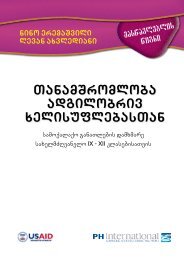The Geneva Protocol, by David Hunter Miller
The Geneva Protocol, by David Hunter Miller
The Geneva Protocol, by David Hunter Miller
Create successful ePaper yourself
Turn your PDF publications into a flip-book with our unique Google optimized e-Paper software.
CHAPTER XX. 119<br />
reduction of armaments.<br />
<strong>The</strong> work required, above all, important political negotiations. While the question of arbitration only required<br />
one political decision of principle, namely, the acceptance of compulsory arbitration, and the remainder was<br />
principally a matter of drafting--without question an extremely difficult task--of a scheme for the application<br />
of such arbitration, the questions of security and disarmament necessitated long and laborious political<br />
negotiations; for they involved fundamental interests, questions of vital importance to the States, engagements<br />
so far-reaching as radically to change the general situation of the various countries.<br />
Although in the work of the First Committee the Assembly had distinctly indicated in its resolution of<br />
September 6th that there was a likelihood--indeed, a necessity--of amending the Covenant, the work of the<br />
Third Committee as regards questions of security and reduction of armaments had, in conformity with the<br />
debates of the Assembly, to remain within the framework of the Covenant. Above all, it was a question of<br />
developing and rendering more precise what is already laid down in the Covenant. All our discussions, all our<br />
labours, were guided <strong>by</strong> these principles, and a delicate task was thus imposed upon us. But the spirit of<br />
conciliation which pervaded all the discussions has permitted us to resolve the two problems which were<br />
placed before us. This is, indeed, an important result, and if the solution of the problem of arbitration which<br />
has been so {195} happily arrived at <strong>by</strong> the First Committee be also taken into consideration, we are in the<br />
presence of a system the adoption of which may entirely modify our present political life.<br />
This is the real import of the articles of the <strong>Protocol</strong> concerning the questions of security and reduction of<br />
armaments.<br />
2.--THREAT OF AGGRESSION: PREVENTIVE MEASURES.<br />
Article 7.<br />
<strong>The</strong> pacific settlement of disputes being provided for in the present <strong>Protocol</strong>, the signatory States undertake,<br />
should any conflict arise between them, not to resort to preparations for the settlement of such dispute <strong>by</strong> war<br />
and, in general, to abstain from any act calculated to aggravate or extend the said dispute. This principle<br />
applies both to the period preceding the submission of the dispute to arbitration or conciliation and to the<br />
period in which the case is pending.<br />
This provision is not unaccompanied <strong>by</strong> sanctions. Any appeal against the violation of the aforesaid<br />
undertakings may, in conformity with Article 11 of the Covenant, be brought before the Council. One might<br />
say that, in addition to such primary dispute as is or might be submitted to the Council or to some other<br />
competent organ, a second dispute arises, caused <strong>by</strong> the violation of the undertakings provided for in the first<br />
paragraph.<br />
<strong>The</strong> Council, unless it be of opinion that the appeal is not worthy of consideration, will proceed with the<br />
necessary enquiries and investigations. Should it be established that an offence has been committed against<br />
the provisions of the first paragraph, it will be the duty of the Council, in the light of the results of such<br />
enquiries and investigations, to call upon any State guilty of the offence to put an end thereto. Any such State<br />
failing to comply will be declared <strong>by</strong> the Council to be guilty of violation of the Covenant (Article 11) or the<br />
<strong>Protocol</strong>.<br />
<strong>The</strong> Council must, further, take the necessary measures to put an end, as soon as possible, to a situation<br />
calculated to {196} threaten the peace of the world. <strong>The</strong> text does not define the nature of these preventive<br />
measures. Its elasticity permits the Council to take such measures as may be appropriate in each concrete case,<br />
as, for example, the evacuation of territories.<br />
Any decisions which may be taken <strong>by</strong> the Council in virtue of this Article may be taken <strong>by</strong> a two-thirds
















